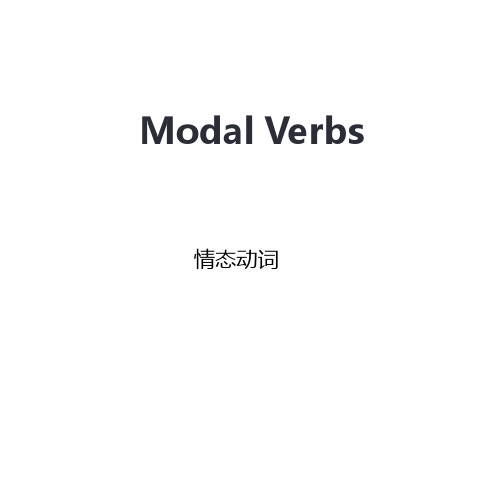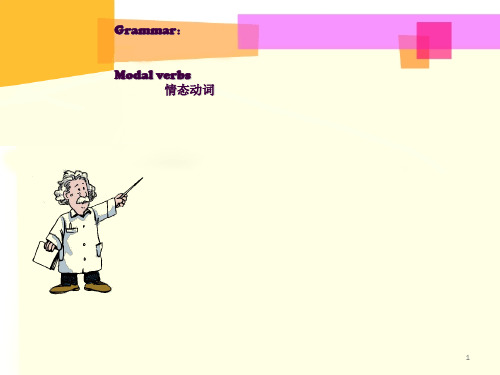初中英语情态动词公开课课件
合集下载
情态动词全部ppt课件

16
Some festivals are held to satisfy the ancestors, who might return either to help or to do harm.
推测
17
--- Excuse me. Is this the right way to the Summer Palace?
3. will/would
1. 表示意愿,will表示现在的意愿, would表示过去的意愿。
I will stick to my plan though all of you are against it.
I told him to give up smoking, but he wouldn’t
3. During the vacation, he would visit me
every four days.
过去的习惯
4. Will / Would you pass me the ball,
please?
请求
习惯,倾向 5. Birds will fly to the south in the winter. 24
You can go with them if you like.
--- Could/Can I have a look at your new design? --- Yes, of course you can.
(注意此处答语不能用could)
8
3)用在肯定句中,表示_客__观__上__有__可_ 能 Anybody can make mistakes. Driving on the snowy roads can be very dangerous.
Some festivals are held to satisfy the ancestors, who might return either to help or to do harm.
推测
17
--- Excuse me. Is this the right way to the Summer Palace?
3. will/would
1. 表示意愿,will表示现在的意愿, would表示过去的意愿。
I will stick to my plan though all of you are against it.
I told him to give up smoking, but he wouldn’t
3. During the vacation, he would visit me
every four days.
过去的习惯
4. Will / Would you pass me the ball,
please?
请求
习惯,倾向 5. Birds will fly to the south in the winter. 24
You can go with them if you like.
--- Could/Can I have a look at your new design? --- Yes, of course you can.
(注意此处答语不能用could)
8
3)用在肯定句中,表示_客__观__上__有__可_ 能 Anybody can make mistakes. Driving on the snowy roads can be very dangerous.
情态动词讲解精ppt课件

例句
will/would
详细描述:will 表示现在的意愿或 预测,would 表示过去的或虚拟 的意愿或预测。
1. I will help you with your project.(我会帮助你完成你的项 目。)
总结词:表示意愿或预测
例句
2. They would have gone to the party if they had known about it earlier.(如果他们早点 知道,他们就会去参加聚会。)
表示意愿
情态动词+动词原形,如 would like to go,表示 某人想要去。
形式变化
基本形式
情态动词的基本形式包括 现在时、过去时和将来时 。
过去式
情态动词的过去式通常是 在基本形式后面加-d或ed,如could have done 、should have done等。
将来时
情态动词的将来时通常是 在基本形式后面加-will或shall,如will be able to 、shall have to等。
may与might的区别与联系
总结词
may表示现在的许可或可能性;might表示过去的可能性或许可。
详细描述
may用于肯定句中,表示许可或可能性,例如“You may use this room.”(你可以使用这个房间。 )“The book may be in the library.”(这本书可能在图书馆里。)might表示过去的可能性,常 用于过去时态的句子中,例如“He might come tomorrow.”(他明天可能来。)
未必、很难说
She might not agree with us.
表示虚拟语气
will/would
详细描述:will 表示现在的意愿或 预测,would 表示过去的或虚拟 的意愿或预测。
1. I will help you with your project.(我会帮助你完成你的项 目。)
总结词:表示意愿或预测
例句
2. They would have gone to the party if they had known about it earlier.(如果他们早点 知道,他们就会去参加聚会。)
表示意愿
情态动词+动词原形,如 would like to go,表示 某人想要去。
形式变化
基本形式
情态动词的基本形式包括 现在时、过去时和将来时 。
过去式
情态动词的过去式通常是 在基本形式后面加-d或ed,如could have done 、should have done等。
将来时
情态动词的将来时通常是 在基本形式后面加-will或shall,如will be able to 、shall have to等。
may与might的区别与联系
总结词
may表示现在的许可或可能性;might表示过去的可能性或许可。
详细描述
may用于肯定句中,表示许可或可能性,例如“You may use this room.”(你可以使用这个房间。 )“The book may be in the library.”(这本书可能在图书馆里。)might表示过去的可能性,常 用于过去时态的句子中,例如“He might come tomorrow.”(他明天可能来。)
未必、很难说
She might not agree with us.
表示虚拟语气
初中英语情态动词_专业级别ppt课件

最新课件
8
2) 表示请求和允许。
• -----Can I go now?
• ----- Yes, you can. / No, you can’t. 此 时可与may互换。在疑问句中还可用 could, might代替,不是过去式,只是语 气更委婉,不能用于肯定句和答语中。
---- Could I come to see you tomorrow? ---- Yes, you can. ( No, I’m afraid not. )
Someone is knocking at the door, and who can it be?
It can’t be Tom because he has gone to
Beijing.
最新课件
10
四、 shall
1) shall 用于第一人称,征求对方的意见。 What shall we do this evening?
最新课件
16
2)表示请求、建议或征求对方意见时, 用Would you…? 比用Will you…?更婉转。
如:
• Will/Would you please keep the door open?请让门开着好吗?
• Will/Would you go with me?你愿意和 我一起去吗?
最新课件
• Did anyone dare (to) admit it?有人敢 于承认吗?
He did not dare (to) leave his car there. 他不敢把车停放在那里。
If he dares to show up at her house I’ll be surprised. 如果他敢出现 在她的房子里,我会感到吃惊。
情态动词专题知识公开课获奖课件

第7页
②在予以他人许可时,常用can,但有时也用may。不能用 might。
-May I play basketball this afternoon? 今天下午我可以打篮球吗? -Yes,you may. 行,可以。
第8页
(2)表达也许性 may和might表达也许性时,可以对目前、过去或未来进行 推测。 Peter may e with us tonight,but he isn't sure yet. 彼得今晚也许和我们一起来,但他还没确定。 He might be studying in the classroom. 他也许正在教室里学习。
用于必定句,表示对
taken the other road.It might have
过去没有做某事遗憾,意思 been quicker.可能我们本应走另一
should/ou 为“原来能够……(但实际 条路,那样可能更加快些。
第17页
(3)用于法律、公约、约定等正式条文,重要用于第三人称。 Students shall remain in their seats until all the papers have been collected. 试卷所有收回后学生方可离开座位。
第18页
5. will和would使用措施 作情态动词will,would与作助动词will,would多种形式相 似。 (1)表达自愿做或积极提出做什么,如意志、愿望或决心等。 would用于过去状况。
第14页
The TV set is broken. I have to buy a new one. 电视机坏了。我不得不再买台新。 The students will have to know how to use the puters. 学生将必须理解怎样使用电脑。 He had to go,because his mother was ill. 他不得不离开,由于他母亲病了。
②在予以他人许可时,常用can,但有时也用may。不能用 might。
-May I play basketball this afternoon? 今天下午我可以打篮球吗? -Yes,you may. 行,可以。
第8页
(2)表达也许性 may和might表达也许性时,可以对目前、过去或未来进行 推测。 Peter may e with us tonight,but he isn't sure yet. 彼得今晚也许和我们一起来,但他还没确定。 He might be studying in the classroom. 他也许正在教室里学习。
用于必定句,表示对
taken the other road.It might have
过去没有做某事遗憾,意思 been quicker.可能我们本应走另一
should/ou 为“原来能够……(但实际 条路,那样可能更加快些。
第17页
(3)用于法律、公约、约定等正式条文,重要用于第三人称。 Students shall remain in their seats until all the papers have been collected. 试卷所有收回后学生方可离开座位。
第18页
5. will和would使用措施 作情态动词will,would与作助动词will,would多种形式相 似。 (1)表达自愿做或积极提出做什么,如意志、愿望或决心等。 would用于过去状况。
第14页
The TV set is broken. I have to buy a new one. 电视机坏了。我不得不再买台新。 The students will have to know how to use the puters. 学生将必须理解怎样使用电脑。 He had to go,because his mother was ill. 他不得不离开,由于他母亲病了。
初中英语情态动词课件ppt61页

A. can C. may
B. has to D. should
分析下句子的用法
May you have a good time. May you be happy.
May you have a good time. 祝你好运。
May you be happy. 希望你开心。
3、 表示希望、祈求、祝愿,常可以译为“祝愿”
三、can/could的用法
Know-point 3
I can play the piano I can play football. 1、表示能力(如体力和脑力方面),意为“能、会
Give more examples.
翻译下列句子 1、 你可以帮助我吗? 2、你不可以玩电脑。
2、表示请求或者允许,多用在口语中,意为“可以、 能”等客观条件的允许。 用于疑问句中用来提出要求, could比can更委婉。 用于否定句中表示不允许(多用can)。
3、在两者都可以用时,may更客气一些
4、在陈述句中用can比较多 You can sit here.
5、can还可以表示能力,may无此用法
6、在否定句中一般不用may not,常用can't表示 不可能
He can't be at home tonight.
Practise 1. You ______ (can/may) go to the cinema this evening.
I can play the piano She must be happy.
一、情态动词的概念
Know-point 1
表示说话人的情绪、态度或语气的动词,表可能, 怀疑,允诺,愿望等。没有人称和数的变化。 I can play the piano. She must be happy.
我的公开课情态动词课件

2. —What’s the name of the book? —Khulaifi. _________ I spell it for you? A. Shall B. Would C. Can D. Might
情态动词表必要性
• must • need
高考真题演练
must 表“必须”
mustn’t 禁止
A. might B. must C. would D. can
3. What do you mean, there are only ten tickets? There ______ be twelve.
A. should B. would C. will D. shall
4. It is usually warm in my hometown in March, but it _____ be rather cold sometimes.
1. 不必须
don’t have to needn’t do
don’t need to
2. must还可表示“偏偏、偏要” e.g. Must you make so much noise?
• You ___ buy a gift, but you can if you want to.
• must
1. 常用于否定句或疑问句。 e.g. You can’t be hungry already — you had
lunch only two hours ago!
2. can用于肯定句中表示理论上的可能性,并不 牵涉是否真的会发生
e.g. You can hurt yourself if you play in the street.
A. must B. can C. should D. would
《情态动词讲解》课件

1
表示能力和可能性
这一用法涉及到情态动词在表示一个
表示推测和推断
2
人或事物的能力或可能性方面的应用。
情态动词还可用来表示具有推测性质
的情况和推断。
3
表示义务和建议
情态动词可用于表示某人应该或必须
表示意愿和打算
4
做的事情,或者提出建议。
用情态动词来表达某人的意愿或打算 进行的行为。
情态动词的否定和疑问
3 同时使用情态动词和实义动词时的注意事项
了解使用情态动词和实义动词时需要注意的细节。
总结
情态动词的重要性
深入理解情态动词的重要性,以及它们在语言中 的作用。
情态动词的学习方法
提供一些有效的学习方法,帮助您更好地掌握情 态动词的用法。
参考资料
书籍推荐
推荐一些深入学习情态动词的相关书籍。
网站推荐
建议一些在线资源,以便进一步学习和练习 情态动词。
2 may/might
表示推测和推断的情态 动词。
3 shall/should
表示义务和建议的情态 动词。
4 will/would
表示意愿和打算的情态动词。
5 must
表示必须和必然的情态动词。
情态动词的用法
情态动词有多种用法,我们将详细讨论其中的一些,包括表示能力和可能性、推测和推断、义务和建 议,以及意愿和打算。
特点
情态动词具有几个典型的特点,例如它们没有人称和数的变化,并且后面跟原形动词。
情态动词的种类
情态动词有几种常见的类型,我们将深入讨论其中的几个种类,包括can/could、may/might、 shall/should、will/would以及must。
1 can/could
英语八年级情态动词ppt课件

③have to的否定形式是don’t have to, 相当于needn’t, 意为“不必”;mustn’t 表示“禁止,不允许”.
认识到了贫困户贫困的根本原因,才 能开始 对症下 药,然 后药到 病除。 近年来 国家对 扶贫工 作高度 重视, 已经展 开了“ 精准扶 贫”项 目
(5) can’t 和 mustn’t 表否定推测时应用can’t, mustn’t 意为“禁止,不允许”, 不用来表推测,在肯定句中用must表推测,意为“一定”
认识到了贫困户贫困的根本原因,才 能开始 对症下 药,然 后药到 病除。 近年来 国家对 扶贫工 作高度 重视, 已经展 开了“ 精准扶 贫”项 目
二、情态动词的用法
1. Can的 用法
⑴ 常用来表示能力,意为“能,会”。 eg:She can swim fast, but I can’t.
⑵表示请求或许可,意为“可以”。 eg: Can you go shopping with us?
D. wouldn’t
认识到了贫困户贫困的根本原因,才 能开始 对症下 药,然 后药到 病除。 近年来 国家对 扶贫工 作高度 重视, 已经展 开了“ 精准扶 贫”项 目
4) can’t 可用来作May I ….?的否定回答 ----May I go surfing alone this afternoon? ----No, you can’t . It’s dangerous. 5) can和 be able to 两者都是表示“能力”是用法相同,但can只有原形和 过去式could两种形式,其他时态要用be able to来表 示。另外,be able to常常有“成功做了某事”的意味 Jim can’t speak English. We were able to reach the top of the maintain at noon.
认识到了贫困户贫困的根本原因,才 能开始 对症下 药,然 后药到 病除。 近年来 国家对 扶贫工 作高度 重视, 已经展 开了“ 精准扶 贫”项 目
(5) can’t 和 mustn’t 表否定推测时应用can’t, mustn’t 意为“禁止,不允许”, 不用来表推测,在肯定句中用must表推测,意为“一定”
认识到了贫困户贫困的根本原因,才 能开始 对症下 药,然 后药到 病除。 近年来 国家对 扶贫工 作高度 重视, 已经展 开了“ 精准扶 贫”项 目
二、情态动词的用法
1. Can的 用法
⑴ 常用来表示能力,意为“能,会”。 eg:She can swim fast, but I can’t.
⑵表示请求或许可,意为“可以”。 eg: Can you go shopping with us?
D. wouldn’t
认识到了贫困户贫困的根本原因,才 能开始 对症下 药,然 后药到 病除。 近年来 国家对 扶贫工 作高度 重视, 已经展 开了“ 精准扶 贫”项 目
4) can’t 可用来作May I ….?的否定回答 ----May I go surfing alone this afternoon? ----No, you can’t . It’s dangerous. 5) can和 be able to 两者都是表示“能力”是用法相同,但can只有原形和 过去式could两种形式,其他时态要用be able to来表 示。另外,be able to常常有“成功做了某事”的意味 Jim can’t speak English. We were able to reach the top of the maintain at noon.
初中英语语法-情态动词PPT课件

2021
10
四、 shall
1) shall 用于第一人称,征求对方的意见。 What shall we do this evening? shall I clean the room for you?
2021
11
2) shall 用于第二、三人称,表示说话人给对方的命令、警 告、允诺或威胁。
We should obey traffic laws. You shouldn‘t watch TV every day。 You shouldn’t have made this kind of silly mistakes. Tom should have brought his report today. 这时它可以和 ought to, be supposed to 互换使用
You can never imagine such a gentleman should be so rude to a lady.
2021
15
六: will 和would
1)表示意志或意愿:决心,愿意,…… We will do our best to save the child. 我们会尽力
I’ll not be able to come this afternoon. 当表示“经过努力才得以做成功某事”时应用be able to,
不能用Can。如:
He was able to go to the party yesterday evening in spite of the heavy rain.
Did anyone dare (to) admit it?有人敢于承认吗?
He did not dare (to) leave his car there. 他不 敢把车停放在那里。
初中英语情态动词公开课课件

重难点解析
二者所适用的句子类型不同。一般说来,can多用于疑问 句和否定句,表示怀疑或不相信等态度;而may则多用于 陈述句(肯定),表示一种揣测。如: Can it be true? No, it can not be true. Where can they be now? I hear there may be a few copies left. What he said may not be right.
重难点解析
6
must表示推测 must 表示对已发生的事情的推测时,must 要接完成式。 I didn‟t hear the phone. I must have been asleep. 我刚才没有听到电话,我想必是睡着了。
典型例题解析
【例1】—Where's Mr Li?I have something unusual to tell him. [2003 黑龙江] —You ____ find him.He______Japan. C A.may not,has gone to B.may not, has been to C.can't,has gone to D.can't, has been to
重难点解析
二者所强调的意思不同。一般来说,can强调客观上的可 能性,而may则强调主观上的推测或判断。如: Man cannot live without air or water. She may be in the library, I suppose. She may not be there today.
重难点解析
3
比较can 和be able to can/could 表示能力;可能 (过去时用could), 只用于现在式和过去式(could)。be able to可以用于各种 时态。 They will be able to tell you the news soon. 他很快就 能告诉你消息了 只用be able to a. 位于助动词后。 b. 情态动词后。 c. 表示过去某时刻动作时。 d. 用于句首表示条件。
初中英语-情态动词-课件(共31张PPT)

二、情态动词的用法 4.dare和need
need “需要” dare“敢” 可作情态动词也可作实义动词
• (2)当实义动词使用时,有人称和时态的变化 • e.g.You don't need to do it yourself. • He did not dare(to) look up.
• ——Can you drive a car at present? • ——I_____ do so in the busy street.
• A.may not C.daren't
B.don't dare D.needn't
二、情态动词的用法 ed to和had better
• (1)used to表示过去的习惯动作或状态,现 已不存在。
• e.g.There used to be our playground.
二、情态动词的用法 ed to和had better
time. • I'll not be able to come this afternoon.
二、情态动词的用法
• (2)表客观可能性,在疑问句中表示请求或许可 • e.g.Man can not live without air. • Can I use your pen?
• *could是can的过去时,主要用于疑问句,表示语气委婉。 • 肯定回答用 • 否定回答可用
C.should tell
D.should have told
二、情态动词的用法 7.will和would
(1)表意愿,用于各种人称的陈述句。
• e.g.I will do anything for you. • If you will read the book,I'll lend it to you.
初中情态动词ppt课件

• 4.We_d_o_n_'t_h_a_v_e__to_arrive so early.
命令禁止
must 必须,一定,表达说话人的主观看法 have to 不得不,强调客观需要 mustn't 禁止,不准,绝对不可以 don't have to 没必要
• 4.----Mum,can I wear my jeans to school? • ----No,you________wear your shool uniform.That's the
命令禁止 must have to mustn't don't have to
• 1.He is my best friend,so I__m_u_s_t______help him. • 2.He_h_a_s_t_o______get to school before 8 o'clock. • 3.We_m_u_s_t_n_'t_____sleep in class.
----Yes,please.//----Thanks, but i can manage it. 4.Could you please help me?
----Yes,with pleasure. ----Sorry,I can't.You had better try to ask someone else.
school rule. • A.can B.can't C.have to D.may
• 4.----Mum,can I wear my jeans to school? • ----No,you________wear your shool uniform.That's the
命令禁止
must 必须,一定,表达说话人的主观看法 have to 不得不,强调客观需要 mustn't 禁止,不准,绝对不可以 don't have to 没必要
• 4.----Mum,can I wear my jeans to school? • ----No,you________wear your shool uniform.That's the
命令禁止 must have to mustn't don't have to
• 1.He is my best friend,so I__m_u_s_t______help him. • 2.He_h_a_s_t_o______get to school before 8 o'clock. • 3.We_m_u_s_t_n_'t_____sleep in class.
----Yes,please.//----Thanks, but i can manage it. 4.Could you please help me?
----Yes,with pleasure. ----Sorry,I can't.You had better try to ask someone else.
school rule. • A.can B.can't C.have to D.may
• 4.----Mum,can I wear my jeans to school? • ----No,you________wear your shool uniform.That's the
初一情态动词语法讲解ppt课件

A. can
B. must
C. should
D. May
10.—May I smoke here?
--No, you __________ only do that in the smoking room.
A. can
B. can’t
C. must
D. mustn’t
13
否定回答:
就划线部分提问:Yes, he can.
No, he can’t.
What can your elder brother do?
8
Practice
2.You ______________m__a_y_ (可以) leave now. 否定句:
You may not leave now. 一般疑问句:
应该 意愿 敢 需要 不得不
+ 动词原形
3
肯定
can could may might must should
否定
can not could not may not might not must not should not
缩写否定
can’t couldn’t
/ mightn’t mustn’t shouldn’t
6.—Must I answer this question in English? --No, you _________.
A. mustn’t B. can’t
C. needn’t
D. shouldn’t
7.—Alice, please be quiet! The others __________ hear clearly.
Grammar: Modal verbs
情态动词
情态动词公开课PPT课件

It’s too hot to take
exercise in the
afternoon.
Shall we do the training in the morning?
第22页/共47页
shall: 1.Shall用于第一、第三人称疑问
句中,表示说话人征求对方的意 见、向对方请示或提供帮助 。
1.Shall we begin our lesson?
How delicious
!!!
You should not/ought not to
eat so much before running.
第31页/共47页
should:
1.Should表示劝告、建议、命令, 其同义词是ought to;在疑问句中, 通常用should代替ought…to。
Should I open the window? W ot我hee们srh.应ou当ld要le相ar互n 学fr习om。each
第20页/共47页
5.Making requests (提出要求):
informal
formal
will
can
could
would
I don’t know how to use this equipment!
Can you help me with my training?
第21页/共47页
6.Making suggestions (提出建议):
/No, you can’t/mustn’t.
第19页/共47页
may/might:
2.用于祈使句中表示祝愿。 May you be happy all your life.
Ma祝y你yo成u 功su!cceed. 3.表示推测、可能(只用于肯定句, 疑问句则要用can或could)。
exercise in the
afternoon.
Shall we do the training in the morning?
第22页/共47页
shall: 1.Shall用于第一、第三人称疑问
句中,表示说话人征求对方的意 见、向对方请示或提供帮助 。
1.Shall we begin our lesson?
How delicious
!!!
You should not/ought not to
eat so much before running.
第31页/共47页
should:
1.Should表示劝告、建议、命令, 其同义词是ought to;在疑问句中, 通常用should代替ought…to。
Should I open the window? W ot我hee们srh.应ou当ld要le相ar互n 学fr习om。each
第20页/共47页
5.Making requests (提出要求):
informal
formal
will
can
could
would
I don’t know how to use this equipment!
Can you help me with my training?
第21页/共47页
6.Making suggestions (提出建议):
/No, you can’t/mustn’t.
第19页/共47页
may/might:
2.用于祈使句中表示祝愿。 May you be happy all your life.
Ma祝y你yo成u 功su!cceed. 3.表示推测、可能(只用于肯定句, 疑问句则要用can或could)。
- 1、下载文档前请自行甄别文档内容的完整性,平台不提供额外的编辑、内容补充、找答案等附加服务。
- 2、"仅部分预览"的文档,不可在线预览部分如存在完整性等问题,可反馈申请退款(可完整预览的文档不适用该条件!)。
- 3、如文档侵犯您的权益,请联系客服反馈,我们会尽快为您处理(人工客服工作时间:9:00-18:30)。
在回答以must开头的一般疑问句时, 否定式需用need not (needn’t),表示 “不必”的意思。如: — Must we hand in our exercises today? — Yes, you must. ( No, you needn’t)
考点揭密
5
shall, will用来征求对方意见,shall用于第一人称,will 用于第二人称,用来表示意愿;shall用于第二、第三人 称,will用于第一人称。
重难点解析
二者表示的语气不同。在否定句中,can表达的否定语气 较强,意为“不可能”;而may表达的否定语气较弱,意 为“可能不”或“也许不”。如:
That cannot be true. (=It is impossible that that is true.) That may not be true. (=It is possible that that is not 根据以上分析,我们可以归纳为三条原则: true.) (1) 在肯定句中用may不用can; (2) 在疑问句中用can不用may; (3) 在否定句中,若语气肯定,表示“不可能”时用 can not,若语气不肯定,表示“可能不”时用may
重难点解析
5
比较have to和must
在否定结构中: don„t have to 表示“不必” mustn‟t 表示“禁止”, You don„t have to tell him about it. 你不一定要把此事告诉他。 You mustn‟t tell him about it. 你一定不要把这件事告诉他。
重难点解析
3
比较can 和be able to can/could 表示能力;可能 (过去时用could), 只用于现在式和过去式(could)。be able to可以用于各种 时态。 They will be able to tell you the news soon. 他很快就 能告诉你消息了 只用be able to a. 位于助动词后。 b. 情态动词后。 c. 表示过去某时刻动作时。 d. 用于句首表示条件。
1
考点揭密
may
2
may表示允许、也许,意为“可以,也许,可能”。对 may的一般问句的回答,肯定回答一般是:Yes, please./ Certainly./ Sure等,否定回答一般是:Please don't./No ,you can't/mustn't. might是may的过去式,与may用法类似,常用于过去时 中;用在疑问句中,还可表示委婉客气。
【例2】 —Could I look at your pictures? B [2003 武汉] —Yes,of course you _________. A.could B.can C.will D.might
典型例题解析
【例3】—Where is Jack,please? D —He______be in the classroom.[2003 杭州] A.can B.need C.would D.must
【例4】 The boy said he had to speak English in class, but he B speak it after class.[2003,广州] A.could B. didn't have to C.might D. shouldn't
6
would, should为will,shall 的过去式,would用于现在 时,表示委婉提出请求、建议或看法,如Would you please not do it again? should还有“应该”的意思, 但语气比must 弱。
重难点解析
1
怎样选用can和may 情态动词can和may都能表示“可能性”。如: He may be right. 他可能对。 He can‟t be right. 他不可能对。 那么,在表示可能性这个概念时,二者的区别是什么呢?
重难点解析
将来时:can没有将来式,此时要用will be able to。如 : I will be able to speak English in three years. 但决定将来是否有能力时,也常用can。如 Can you come to see us nest Sunday? 过去时,could表示一般能力,was/were able to表示具 体场合的能力。如 My father could speak English. He was able to translate this story into French. How many eggs were you able to get? Could的否定式也可表示具体场合的能力。 The question was so difficult that he wasn‟t able to/couldn‟t answer it.
重难点解析
e. 表示成功地做了某事时,只能用was/were able to, 不能用could。 He was able to flee Europe before the war broke out. = He managed to flee Europe before the war broke out. 注意:could不表示时态 1)提出委婉的请求,(注意在回答中不可用could)。 --- Could I have the television on? --- Yes, you can. / No, you can„t. 2)在否定,疑问句中表示推测或怀疑。 He couldn‟t be a bad man. 他不大可能是坏人。
重难点解析
2
浅析can和be able to的区别 现在时:can与be able to一样,但后者不常用。如:
He can write well. He is able to write well. 但be able to后不能接被动语态不的定式。如 The star cannot be see. (正) The star is not able to be seen. (误)
重难点解析
二者所适用的句子类型不同。一般说来,can多用于疑问 句和否定句,表示怀疑或不相信等态度;而may则多用于 陈述句(肯定),表示一种揣测。如: Can it be true? No, it can not be true. Where can they be now? I hear there may be a few copies left. What he said may not be right.
重难点解析
6
must表示推测 must 表示对已发生的事情的推测时,must 要接完成式。 I didn‟t hear the phone. I must have been asleep. 我刚才没有听到电话,我想必是睡着了。
典型例题解析
【例1】—Where's Mr Li?I have something unusual to tell him. [2003 黑龙江] —You ____ find him.He______Japan. C A.may not,has gone to B.may not, has been to C.can't,has gone to D.can't, has been to
考点揭密
3
4
must must 表示必须要做的事,意为“必须,应该”。must一 般问句的否定回答用needn't或don't have to,而不用 mustn't, mustn't意为“不可以,不能”,表禁止,不许 可。另外, must还可表示有把握的推测,意为“一定、肯定”。must 的过去式还是 must。 need need 作情态动词主要用于问句和否定句中,意为“必要 ”。need一般问句的肯定回答用 must,否定回答用 needn't,如:Need I do it right now?肯定回答:Yes, you must。否定回答:No, you needn't. need作行为动 词,有人称、数和时态的变化,后接动词要加to do不定 式。
中考复习 词汇专题 (情态动词)
考点揭密 重难点解析 典型例题分析 课时训练
考点揭密
1 2 掌握情态动词的定义:表示可能、怀疑、允诺、愿望、义 务、必要、猜测等的动词是情态动词。
掌握情态动词的语法特征 1) 情态动词不能表示正在发生或已经发生的事情,只 表示期待或估计某事的发生。 2) 情态动词 除ought 和have 外,后面只能接不带 to 的不定式。 3) 情态动词没有人称,数的变化,即情态动词第三人 称单数不加-s。 4) 情态动词没有非谓语形式,即没有不定式,分词, 等形式。
重难点解析
6
must表示推测 must用在肯定句中表示较有把握的推测,意为“一定”。 must表对现在的状态或现在正发生的事情的推测时, must 后面通常接系动词be 的原形或行为动词的进行式。 You have worked hard all day. You must be tired. 你 辛苦干一整天,一定累了。(对现在情况的推测判断) He must be working in his office. 他一定在办公室工作 呢。 比较: He must be staying there. 他现在肯定呆在那里。 He must stay there. 他必须呆在那。
考点揭密
3 掌握常用情态动can, could, may, might, must, need, shall, will, should, would等的用法。 can can 可表示能力、允许、可能性、怀疑猜测,意为“能, 会,可以”;can't意为“不会,不能,不可以”,还有 “不可能”之意。could为can的过去式,用法与can类 似,常用于过去时中;could还可用于现在时中表示委婉 客气,相当于can;could也可表示惊讶怀疑,不相信, 如:He couldn't be a thief.
